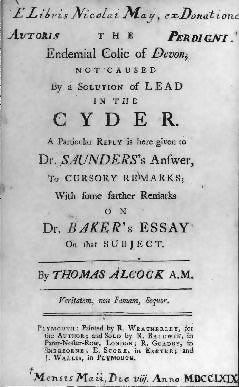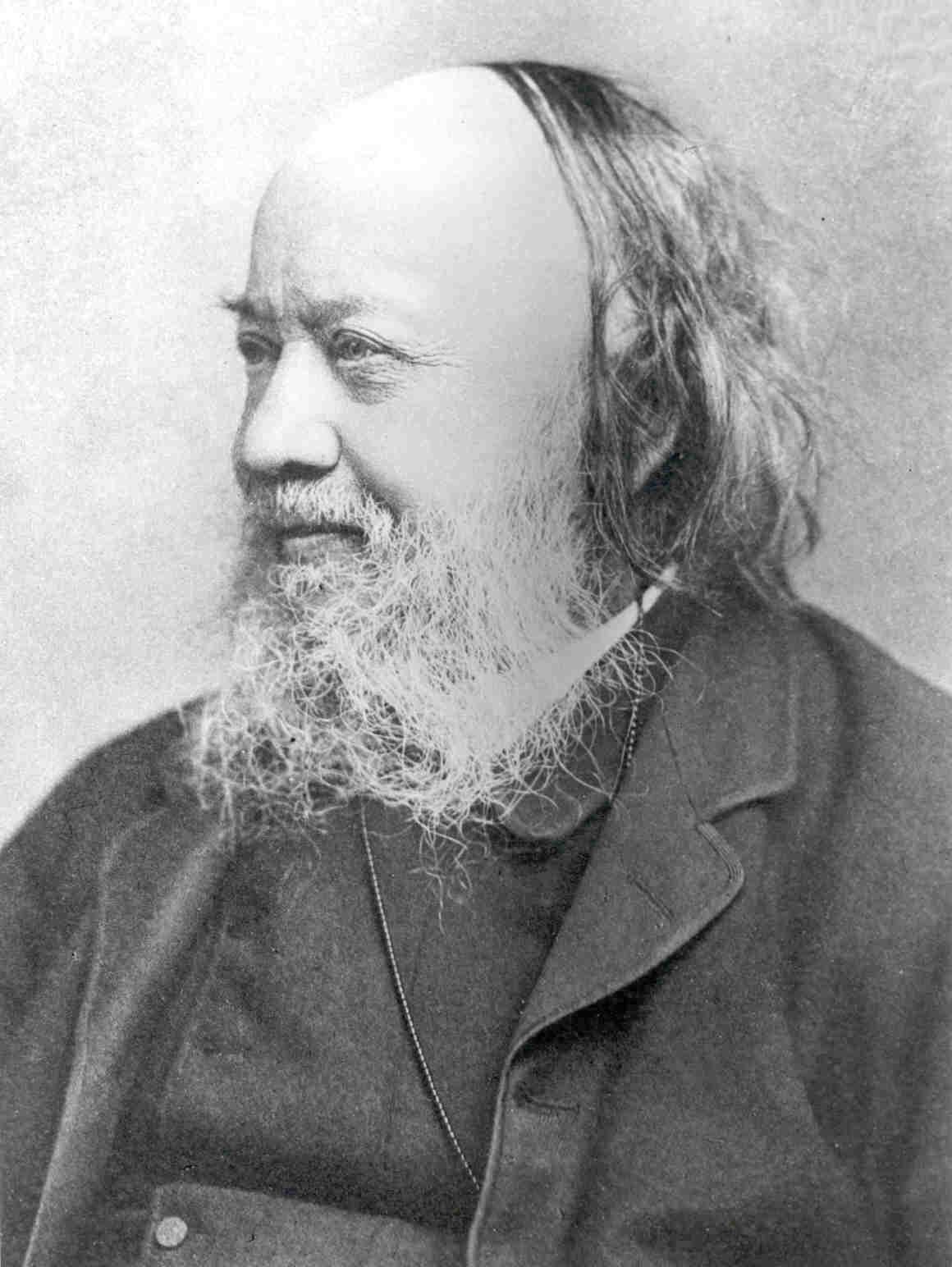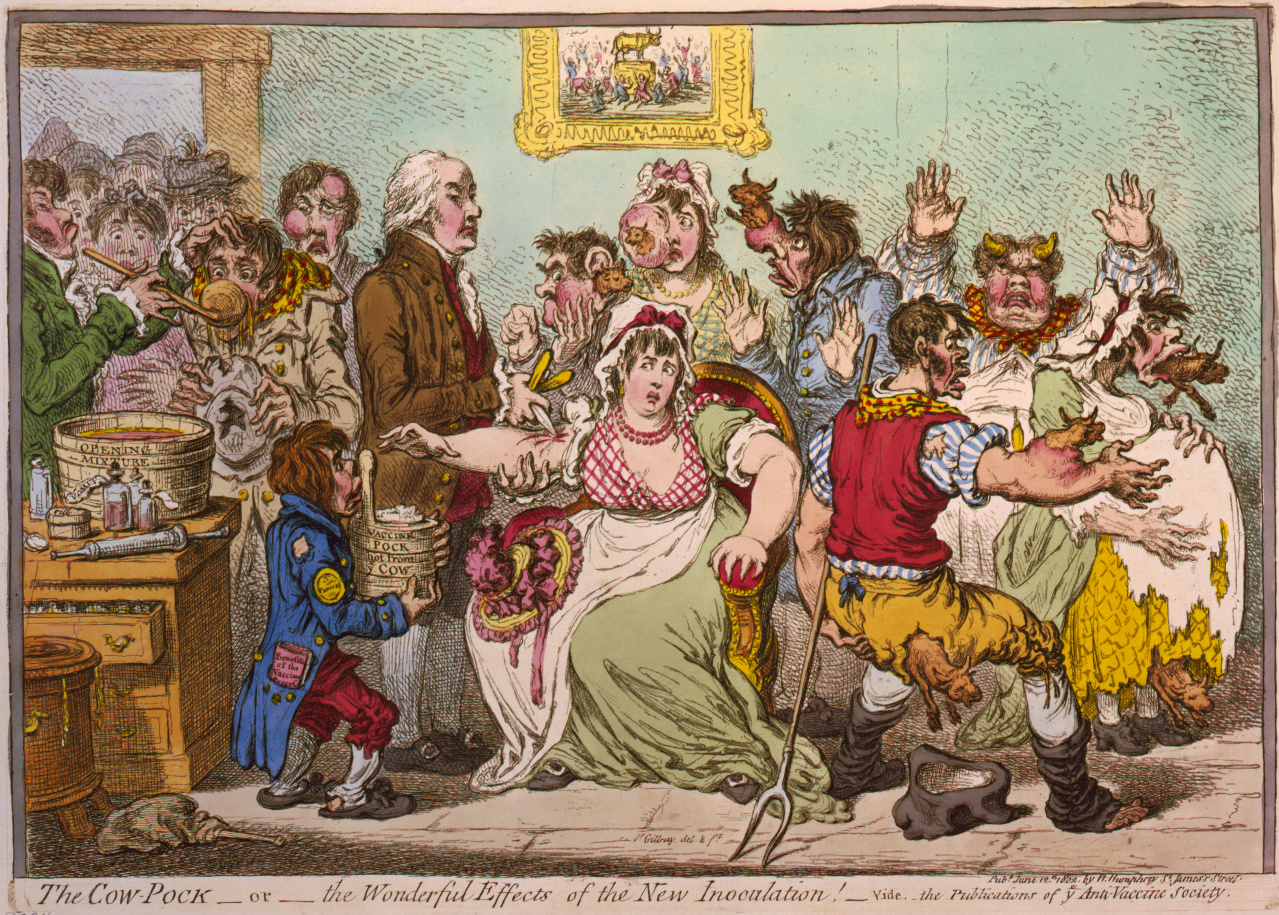1750 — Typhus epidemic sweeps through London, killing thousands including the Lord Mayor. An inquiry traces one possible origin to Newgate Prison, which was “in a very filthy condition and had long been so.” This will lead, by 1779, to John Howard’s calls for reform.
1750 — Gin Lane, an engraving by English artist William Hogarth, helps spur social reform. The engraving depicts a drunken mother surrounded by a scene of squalor. A year later, the Gin Acts give magistrates control over licensing pubs in Britain, and beer becomes a more common drink.
1753 — March 26, Benjamin Thompson, Count Rumford born in North Woburn, Mass. Thompson was a British loyalist who joined the British Army during the American Revolution and was subsequently made Count Rumford by George III. He went into exile after the revolution and worked for the Kingdom of Bavaria for much of his life. In science, he was known for early theories of thermodynamics. In public health he was known for his advocacy of public hygiene and better living conditions for the poor. For example, he campaigned (especially in Austria) for lowering the cost of living, providing inexpensive and health homes with cheap supply of heat and light, warm meals for school children and soup kitchens for the hungry. There were, he said, “other kinds of glory than that of victory in battle.”( Lehrburger 1953). Rumford died in France.
1754 — James Lind publishes A Treatise on Scurvy. At the time, more British sailors were dying from scurvy during wartime than were killed in combat. Nearly two centuries earlier the Dutch had discovered the benefits of citrus fruits and juices to sailors on long voyages. When the practice is finally adopted by the Royal Navy in 1795, scurvy disappeared from the ranks Òas if by magic.Ó
1760 — First experiments on use of coal-gas for lighting by coal mine owner George Dixon in Newcastle, England.
1762 –1769 — Philadelphia committee led by Benjamin Franklin attempts to regulate waste disposal and water pollution.
1760s – 1790s — French Enlightenment philosophers reconsider the social contract and the role of the state, problems of the wretchedly poor weigh heavily. French philosopher Baudeau writes that “the true poor have a real right to demand basic necessities.” Similarly, the Baron de Montyon in 1778 argues that poverty is “a slow poison” and that malnutrition, high infant mortality and injuries from dangerous trades were all problems of the poor which the government must address. These ideas will become part of the French revolution’s public health policy (See 1789).
 1767 — Devonshire Colic — From Sept. 1762 to July 1767 almost 300 cases of what was called Devonshire Colic were taken to Exeter hospitals. English physician George Baker (with help from Benjamin Franklin) noticed the symptoms were similar to those shown by painters who suffered from lead poisoning. With this clue, Baker examined Devonshire cider and found it contained lead. He also examined the cider presses and found that, unlike cider presses in other regions, the Devonshire presses were lined with sheets of lead.
1767 — Devonshire Colic — From Sept. 1762 to July 1767 almost 300 cases of what was called Devonshire Colic were taken to Exeter hospitals. English physician George Baker (with help from Benjamin Franklin) noticed the symptoms were similar to those shown by painters who suffered from lead poisoning. With this clue, Baker examined Devonshire cider and found it contained lead. He also examined the cider presses and found that, unlike cider presses in other regions, the Devonshire presses were lined with sheets of lead.
1769, Sept. 14 — Alexander Von Humboldt born in Germany. Explorer and pioneering geographer for whom the Humboldt current is named. Von Humbolt noted in 1819 that the fluctuating levels of a Venezuelan lake were related to deforestation in the surrounding hills.
By felling the trees that cover the tops and sides of mountains, men in every climate prepaer at once two calamities for future generations: the want of fuel and the scarcity of water… When forests are destroyed … the beds of rivers, remaining dry during part of the year, are converted into torrents whenever great rain falls on the heights…
1770, April 7 — William Wordsworth born (1770 – 1850) First of the English romantic poets, is born. Wordsworth thought the Industrial revolution was an “outrage done to nature” and was appalled that the common people were no longer “breathing fresh air” or “treading the green earth.”
1773 — William Bartram (1739-1823) American naturalist sets out on a five year journey through the US Southeast to describe wildlife and wilderness from Florida to the Mississippi. His book, Travels, is published in 1791 and becomes one of the early literary classics of the new United States of America. See the Travels of William Bartram web site.
1775 — English scientist Percival Pott finds that coal is causing an unusually high incidence of cancer among chimney sweeps.
1776 — Countess Nevet de Coigny wins her lawsuit against lead mine owners in Brittany, France, for damages to fishing and crops. (Lienhard, 1997). (Although this is given as an unusual example of concern for the environment, it is properly placed in the context of rising concern for occupational health).
1779 — John Howard, sheriff of Bedfordshire, writes State of the Prisons showing how prison diseases could spread to the general population. ÒPeople are galvanized into action when the facts about social disease are forced upon them,” he said. His campaign is an early example of how “… an aroused public opinion could be employed as a lever to compel reform.”
1779 — Johann Peter Frank (1745-1821), writes A Complete System of Medical Policy in Germany advocating governmental responsibility for clean water, sewage systems, garbage disposal, food inspection and other health measures under an authoritative “medical police.” This idea was well received and influenced policy in Germany, Italy and other nearby nations. The authoritarian approach did not sit well with the French, British or Americans, where direct government controls developed only in areas of specific problems such as communicable disease and sanitation.
1783 — US diplomats make fishing rights in waters off Newfoundland a high priority in negotiations over independence from Britain.
1785 — April 26 — John James Audubon born in Les Cayes Haiti. He moved to Philadelphia in 1803 and failed at business during the depression of 1819. In 1826 the first edition of Birds of America, an ongoing collection of color engravings, was published in Scotland. He returned to America in 1839 to continue collecting and painting. He died in 1851. The Audubon Society, was founded in 1905 in his honor by George Bird Grinell. Also see Audubon Society biography.
1785 — Thomas Jefferson publishes Notes on the State of Virginia which, in part, argues against the European superstition that the new continent had degenerate animals and plants. He writes about quadrapeds “not to produce a conclusion in favour of the American species, but to justify a suspension of opinion until we are better informed, and a suspicion in the mean time that there is no uniform difference in favour of either; which is all pretend.”
1785 — Northwest Ordinance passed in US allowing creation of new states in the territory from Ohio to Minnesota.
1786 — Woolen mill workers displaced by machinery petition mill owners in Leeds, England. In 1791, mill owners reply that even though machines have “reduced manual Labour nearly one third, and each [machine] at its first Introduction carried an Alarm to the Work People, yet each has contributed to advance the Wages and to increase the Trade…” This dialogue eventually degenerates into the Luddite Riots of 1811-1812.
1786 — Charles Willson Peale opens a museum in Philadelphia displaying the first reconstructed skeleton of the “American mastodon” and other native animals, along with portraits he had painted of Washington, Jefferson and other revolutionary leaders.
1789 — Kaiser Joseph II of Germany banned animal baiting for sport.
 1789 — July 14 — The storming of the Bastille begins the French Revolution. Although the revolution is remembered for the Terror, French revolutionaries should also be remembered for creating a new kind of public health policy. “The right of property,” said the revolutionary Robespierre, “is limited like all others by the obligation to respect the rights of others. It must not impair either the safety or the liberty or the existence or the property of our fellowmen.” Health became among the most important individual rights, and the state was bound to protect it in the same way that it was bound to protect liberty. The French revolutionaries saw public health policy as part of a new kind of political system that served the people, and they attempted to create the world’s first national system of social assistance and free medical care. Their ideas and institutions did not achieve the ideal, but the emerging French system of free medical care for the poor and open hospitals profoundly influenced the rest of Europe in the 19th century, (Hodgkinson, 1973)
1789 — July 14 — The storming of the Bastille begins the French Revolution. Although the revolution is remembered for the Terror, French revolutionaries should also be remembered for creating a new kind of public health policy. “The right of property,” said the revolutionary Robespierre, “is limited like all others by the obligation to respect the rights of others. It must not impair either the safety or the liberty or the existence or the property of our fellowmen.” Health became among the most important individual rights, and the state was bound to protect it in the same way that it was bound to protect liberty. The French revolutionaries saw public health policy as part of a new kind of political system that served the people, and they attempted to create the world’s first national system of social assistance and free medical care. Their ideas and institutions did not achieve the ideal, but the emerging French system of free medical care for the poor and open hospitals profoundly influenced the rest of Europe in the 19th century, (Hodgkinson, 1973)
1790, April 17 — Benjamin Franklin dies, leaving money in a widely publicized codicil to his will to build fresh water pipeline to Philadelphia due to the link between bad water and disease. The pipeline isn’t built until decades later. Within a few years, one quarter of the population of the town dies in a yellow fever epidemic.
1790 — Emergence in Vermont of the Dorrilites, a short-lived vegan sect which allegedly practiced “free love,” and may have inspired both the Millerites, who became the Seventh Day Adventists, and Joseph Smith, founder of the Church of Jesus Christ of Latterday Saints. (M. Clifton, 2007)
1790 — First US Census counts four million people, all but 10 percent farmers.
1791– The New York state assembly closes the hunting season on the heath hen. The species is extinct by the early 1900s.
1792 — William Murdock (chief engineer with Boulton & Watt) first uses coal gas to light a, small room in Redruth, Cornwall; He improved the gas by passing it through water. This experiment is usually noted as the beginning of the manufactured gas industry, which created vast pools of toxic coal tar in thousands of European and American towns and cities. Although the industry took off in the 1830s, its environmental legacy is only beginning to be understood.
1793 — Eli Whitney develops cotton gin (engine) for pulling seeds from short-staple cotton. The device revolutionizes agriculture in the US South, and large scale plantations built on slavery expand rapidly.
1794, July 5 — Sylvester Graham birthday. The U.S. Presbyterian minister and temperance crusader invented the Graham cracker as an supposed cure for lust. Sylvester Graham became a vegetarian circa 1826 under the influence of the Rev. William Metcalfe, founder of the first vegetarian church in Philadelphia. Metcalfe had been a member of the first vegetarian church in England, the Bible Christian Church founded by William Cowherd near Manchester in 1809. Graham’s followers included William Alcott, M.D., the first prominent vegetarian in the Alcott family, cousin of Bronson Alcott.; pioneering newspaper publisher Horace Greeley; and Seventh Day Adventist Church builders Ellen and James White. Two others, John Harvey Kellogg, M.D., 1854-1941, and his brother W.K. Kellogg, 1860-1951, went on to invent and popularize peanut butter, corn flakes, granola, and soy milk. (M. Clifton, 2007)
1795 — Sir Thomas Percival, a Manchester, UK physician, leads group of doctors who form Manchester Board of Health to supervise textile mills and recommend hours and working conditions. Their report led Sir Robert Peel to introduce the Health and Morals of Apprentices Act of 1802. Children were only permitted to work 12 hours per day, walls had to be washed and visitors had to be admitted to factories to make suggestions.
1796 — Edward Jenner a country physician begins inoculations from cowpox (the bovine form of the disease); and when he later inoculated the same subject with smallpox, the disease did not appear. His inoculation experiments were seen as a milestone in public health.
1798 — Rev. Thomas Malthus writes Essay on the Principle of Population which influenced Darwin and many others. Malthus observed that plants and animals produce far more offspring than can survive, and thought that Man would also be capable of overproducing unless family size was regulated. The main problem would be poverty and famine, he believed. His views were not popular among social reformers who believed that the proper social structures could eradicate the ills of man. In effect, Malthus saw the future as a disaster while reformers (like Edwin Chadwick) saw an emerging utopia.
1799 — Phileppe Lebon, aware of William Murdock’s coal gas experiments seven years beforehand, becomes the first to illuminate a public building with gas. The hotel Seignelay in Paris is lit using wood gas, not coal. Political turmoil curtails the project and then Lebon’s untimely death by robbery 1804 ends the experiments.
1799 — April 17 — Aaron Burr and fellow investors launch the Manhattan Company, a water utility company whose charter also allows the creation of a bank. The bank is set up, and becomes Chase Manhattan (now J.P. Morgan Chase). It would compete with and break the monopoly of Alexander Hamilton’s Bank of New York. Out of two million dollars initial capital, the Manhattan project used one hundred thousand dollars to bring water to Manhattan and the rest was used to start the bank. The concern for public health only became serious after many cholera epidemics, and finally a city-wide water system was established in 1842 with what is now known as the Old Croton Reservoir.

Edwin Chadwick
1800, Jan. 4 — Edwin Chadwick born. Chadwick is the author of the 1842 Report on Sanitary Conditions of the Laboring Population of Great Britain, and he is a tireless — if also tiresome — advocate for public health reform in the UK. By 1852, the London Times will fire off one of the most memorable barbs in Environmental History — apparently tongue-in-cheek — in Chadwick’s direction. “We prefer to take our chance of cholera than be bullied into public health,” the Times says.
1800 — Beginnings of first modern municipal sewers in London, but water supply is still frequently contaminated.
1801 — Chief of the Creek tribe, Mad Dog, complains “our deer and game is almost gone.”
1801 — Philip James de Loutherbourg paints “Coalbrookdale by night,” an early depiction of the Industrial Revolution in the UK.
1803 – Louisiana Purchase finalized April 30. France sold 828,000 square miles stretching from the mouth of the Mississippi River to Idaho.
1803, May 3 — Ralph Waldo Emerson born. Emerson writes Nature in 1836 and is a leader of the Transcendentalist movement that includes Coleridge, Byron, Shelly, Keats, Thoreau, Ruskin, Whitman and others. He died in 1882.
1804 — John Pintard, first Health Inspector in U.S. appointed in New York in response to epidemics of yellow fever. From 1810 — 1838, health inspectors are a branch of the police department with duties including environmental sanitation, vital statistics and law enforcement.
1804 — Smoke in Pittsburgh — Pittsburgh official Presley Neville wrote “the general dissatisfaction which prevails and the frequent complaints which are exhibited, in consequence of the Coal Smoke from many buildings in the Borough, particularly from smithies and blacksmith shops…” The smoke affected the “comfort, health and… peace and harmony” of the new city. As in most other cities, the remedy of the age was to build higher chimneys.
1804 — May 14 — Lewis and Clark expedition begins the journey up the Missouri River to explore the geography, flora and fauna of the interior of North America.
1805 — Cousin de Grainville writes The Last Man, perhaps the first doomsday tale. The French author describes the human race dwindling through natural processes to a lonely end. De Grainville committed suicide shortly after the novel was published. (Weart, p. 19).
1809, Feb. 12 — Birthday of Charles Darwin, whose 1859 book The Origin of Species established the theory of evolution.
1810, Nov. 10 — Birthday of George Jennings, inventor of the flush toilet.




